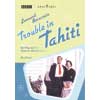Bernstein Trouble in Tahiti
Bernstein’s wry portrait of American suburbia gets a near-ideal production
View record and artist detailsRecord and Artist Details
Composer or Director: Leonard Bernstein
Genre:
DVD
Label: Opus Arte
Magazine Review Date: 3/2003
Media Format: Digital Versatile Disc
Media Runtime: 75
Mastering:
Stereo
Catalogue Number: OA0838D

Tracks:
| Composition | Artist Credit |
|---|---|
| Trouble in Tahiti |
Leonard Bernstein, Composer
City of London Sinfonia Karl Morgan Daymond, Sam, Baritone Leonard Bernstein, Composer Mary Hegarty, Female, Soprano Paul Daniel, Conductor Stephanie Novacek, Dinah, Mezzo soprano Thomas Randle, Gardener, Tenor Toby Stafford-Allen, Milkman, Baritone |
Author: David Gutman
Trouble in Tahiti is often unfairly rated a problem piece in Bernstein’s, for me, rather problematic oeuvre. Scripted as well as composed by him in the early 1950s, it’s a satirical domestic drama that works well enough on its own despite being eventually subsumed into the opera intended to be its sequel, the altogether grander A Quiet Place. There are only five soloists: the mezzo-soprano and baritone principals (Dinah and Sam) plus a Greek chorus of Brechtian Andrews Sisters.
As in Sondheim at his best, the catchy vernacular elements interact unpredictably with the deeper emotions. The protagonists squabble, neglect their son and seek solace in material comforts or the macho possibilities of office and gym. What’s left is the movies: the piece is named after the escapist South Sea Islands fantasy both set out to see as the curtain falls (Dinah has in fact already seen it, recounting its dubious plot in an aria of tremendous verve). The domestic intimacy of the subject matter and the tart manner of its realisation suit the small screen and there have been several such adaptations.
This latest treatment has already been broadcast in the UK and it scooped a prize at the Vienna TV Awards last April. Director Tom Cairns has used the medium with real imagination. Recasting the work as a sort of glorified ’50s TV programme, he includes echo effects and noises off to enhance the stylisation, unafraid to tweak the plot at the margins. The jazz trio become co-workers or nosy neighbours and clever use is made of authentic archival footage and authentic-looking sets. Part of Sam’s ‘masculinity’ aria is set in his gym’s communal showers, which not everyone will like. It’s only when Dinah’s show-stopping ‘cinema’ aria is disrupted by a cut-away to Tom Randle’s Gardener that the imposed narrative works against the musical rhetoric.
Stephanie Novacek and Karl Daymond are hard to fault; both have excellent diction. And, if the contribution of the CLS seems less pointed than it did in an earlier live London performance under Marin Alsop, the recording balance may be largely to blame. Few will cavil when the booklet includes decent notes and a full libretto.
As in Sondheim at his best, the catchy vernacular elements interact unpredictably with the deeper emotions. The protagonists squabble, neglect their son and seek solace in material comforts or the macho possibilities of office and gym. What’s left is the movies: the piece is named after the escapist South Sea Islands fantasy both set out to see as the curtain falls (Dinah has in fact already seen it, recounting its dubious plot in an aria of tremendous verve). The domestic intimacy of the subject matter and the tart manner of its realisation suit the small screen and there have been several such adaptations.
This latest treatment has already been broadcast in the UK and it scooped a prize at the Vienna TV Awards last April. Director Tom Cairns has used the medium with real imagination. Recasting the work as a sort of glorified ’50s TV programme, he includes echo effects and noises off to enhance the stylisation, unafraid to tweak the plot at the margins. The jazz trio become co-workers or nosy neighbours and clever use is made of authentic archival footage and authentic-looking sets. Part of Sam’s ‘masculinity’ aria is set in his gym’s communal showers, which not everyone will like. It’s only when Dinah’s show-stopping ‘cinema’ aria is disrupted by a cut-away to Tom Randle’s Gardener that the imposed narrative works against the musical rhetoric.
Stephanie Novacek and Karl Daymond are hard to fault; both have excellent diction. And, if the contribution of the CLS seems less pointed than it did in an earlier live London performance under Marin Alsop, the recording balance may be largely to blame. Few will cavil when the booklet includes decent notes and a full libretto.
Discover the world's largest classical music catalogue with Presto Music.

Gramophone Digital Club
- Digital Edition
- Digital Archive
- Reviews Database
- Full website access
From £8.75 / month
Subscribe
Gramophone Full Club
- Print Edition
- Digital Edition
- Digital Archive
- Reviews Database
- Full website access
From £11.00 / month
Subscribe
If you are a library, university or other organisation that would be interested in an institutional subscription to Gramophone please click here for further information.




